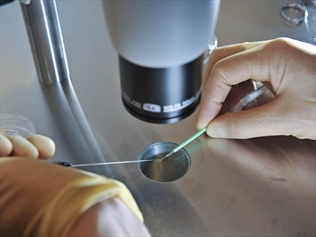More and more Australian women are turning to freezing their eggs in the hope of cheating the biological clock, but fertility experts caution that while the science is solid, the odds are not.
Juliette Saly has built a successful career as a finance journalist, but once she reached her thirties she began to worry about an issue over which she had little control.
“I was highly stressed and anxious about the future and, yes, the baby question was impacting on a lot of things in my life, it was something I thought about all the time,” she recalled.
“One doctor said to me, when it comes to your fertility, 40 is NOT the new 30.
“I just thought, look, I am about to turn 35, I’ve got the money to do it, I’ve got the time to do it.
“I want to put my eggs on ice now, while I am 34, just so I know that I’ve done everything I can while I can to try and give myself the best chance in the future.”
Relationship concerns the main issue for delay
Associate Professor Mark Bowman from the Genea fertility clinic says he speaks to women with the same concerns every week.
“There is a predominance of women presenting between 36 and 40,” Professor Bowman said.
“I don’t think the career thing is the primary issue. It is a combination of issues, but largely it is they haven’t developed a relationship. They have realised through research that fertility declines significantly in their late thirties, and they are trying to figure out what they are going to do about it.”
Fertility clinics are keen to spread the word about egg freezing, and the interest is there, as 7.30 discovered at an information night run by Melbourne IVF called “Eggs and the City”.
More than 180 young women and a couple of men went along to find out more.
Associate Professor Kate Stern from Melbourne IVF says the science of freezing eggs has improved dramatically in recent years.
“Fifteen years ago if a woman froze 10 eggs maybe only two of those eggs would survive, so really she had very little chance of being able to have a baby from that technique,” Professor Stern said.
“Over the last four or five years there have been big inroads in the techniques we use to freeze and thaw eggs, and now 85 to 90 per cent of eggs frozen for a woman less than 38 years of age will survive.”
Thinking about fertility? It may already be too late
And therein lies one of the dilemmas.
By the time most women start to worry, it may already be too late.
“I guess the optimum age to freeze your eggs is really about the same as an optimum age to have a baby … in your mid to late 20s,” Professor Stern said.
“The average age of women coming to talk to us about having their eggs frozen is between 35 and 38 and we have sadly some women in their early 40s coming to us.”
“Now, it is unlikely we will obtain a good number of eggs and give someone a realistic opportunity if they are in their early 40s, and they say, ‘I wish I came sooner’.”
According to Associate Professor Mark Bowman, the rate of success drops markedly as a woman ages.
“If a 32-year-old woman … undertook one round of egg freezing, I doubt the chance of getting a baby out of the subsequent use of those eggs would be much higher than 50/50 … by the time a woman is in her late 30s that figure will have dropped to 15 per cent,” Professor Bowman said.
Cynthia, an IT professional, is another woman who decided to freeze her eggs. She says it made her feel much less anxious.
“(It’s given me) a lot more peace of mind,” she said. “For me, having my eggs frozen lifted the pressure of having to immediately try to have a baby.”
Freezing process explained; procedure can cost $10,000
Each year around 500 freezing cycles are performed in Australia, with 80 per cent of the cases for medical reasons such as women undergoing cancer treatments.
Around 40 babies have been born to frozen eggs in the last two years.
The process itself is relatively simple.
Women self-administer injections of hormones to stimulate their ovaries.
The eggs are then collected during a short procedure under sedation.
And the cost?
Egg freezing for medical reasons, such as for a woman about to undergo treatment for cancer, is covered by Medicare.
For women such as Juliette Saly and Cynthia, undergoing what’s called social freezing, it costs $10,000.
And as Associate Professor Mark Bowman stresses, nothing is certain.
“It might sound like a no-brainer when the consultation starts but at the end of the day they have to understand this is not a 100 per cent guarantee,” he said.
But for Ms Saly, it is worth it for peace of mind.
“It is a pretty expensive insurance policy … (and) like car insurance and home and contents, I hope I never have to use it but I still have to pay it,” she said.
“But it is insuring in myself and my future and it is absolutely worth it.”
